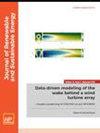A geospatial integrated multi-criteria approach for assessment of solar and wind energy potentials with economic and environmental analysis
IF 1.9
4区 工程技术
Q4 ENERGY & FUELS
引用次数: 0
Abstract
India has made an international commitment to generate about 50% of its total energy needs from renewable energy sources by 2030. Here, to meet such a commitment, this study developed high-resolution (1 × 1 km2) geospatial solar and wind geographical potential maps with an aim to calculate the theoretical and technical potentials with economic and environmental sustainability. These geographical potential maps are developed by taking into account 13 evaluation and restriction factors pertaining to technical, economic, and socio-environmental categories. The investigation identifies that Rajasthan, Karnataka, and Gujarat have a plurality of extremely favorable land areas for solar and wind energy sources. Furthermore, the results imply that appropriate planning for the installation of renewable projects at the identified optimum locations can fulfill India's commitments with regard to an optimal energy mix scenario, with energy available twice the available potential for consumption in 2030. Furthermore, with the least average levelized cost of energy of 38.8 $/MWh (2.83₹/kWh) and 42.3 $/MWh (3.09₹/kWh), solar and wind energy sources are potentially more appealing and affordable than conventional energy sources. The findings of this study will also significantly advance India's attempts to accept and develop renewable energy sources, helping to realize the government's objective for sustainable electricity production.通过经济和环境分析评估太阳能和风能潜力的地理空间综合多标准方法
印度已做出国际承诺,到 2030 年,其能源需求总量的约 50%将来自可再生能源。为实现这一承诺,本研究绘制了高分辨率(1 × 1 平方公里)太阳能和风能地理空间潜力图,旨在计算理论和技术潜力以及经济和环境可持续性。这些地理潜力图的绘制考虑了 13 个与技术、经济和社会环境类别相关的评估和限制因素。调查发现,拉贾斯坦邦、卡纳塔克邦和古吉拉特邦拥有大量对太阳能和风能资源极为有利的土地。此外,调查结果表明,在已确定的最佳地点安装可再生能源项目的适当规划可以实现印度对最佳能源组合方案的承诺,到 2030 年,可利用的能源是现有消费潜力的两倍。此外,太阳能和风能的平均平准化能源成本最低,分别为 38.8 美元/兆瓦时(2.83₹/千瓦时)和 42.3 美元/兆瓦时(3.09₹/千瓦时),因此,与传统能源相比,太阳能和风能可能更具吸引力,也更经济实惠。这项研究的结果也将极大地推动印度接受和开发可再生能源的尝试,帮助实现政府可持续电力生产的目标。
本文章由计算机程序翻译,如有差异,请以英文原文为准。
求助全文
约1分钟内获得全文
求助全文
来源期刊

Journal of Renewable and Sustainable Energy
ENERGY & FUELS-ENERGY & FUELS
CiteScore
4.30
自引率
12.00%
发文量
122
审稿时长
4.2 months
期刊介绍:
The Journal of Renewable and Sustainable Energy (JRSE) is an interdisciplinary, peer-reviewed journal covering all areas of renewable and sustainable energy relevant to the physical science and engineering communities. The interdisciplinary approach of the publication ensures that the editors draw from researchers worldwide in a diverse range of fields.
Topics covered include:
Renewable energy economics and policy
Renewable energy resource assessment
Solar energy: photovoltaics, solar thermal energy, solar energy for fuels
Wind energy: wind farms, rotors and blades, on- and offshore wind conditions, aerodynamics, fluid dynamics
Bioenergy: biofuels, biomass conversion, artificial photosynthesis
Distributed energy generation: rooftop PV, distributed fuel cells, distributed wind, micro-hydrogen power generation
Power distribution & systems modeling: power electronics and controls, smart grid
Energy efficient buildings: smart windows, PV, wind, power management
Energy conversion: flexoelectric, piezoelectric, thermoelectric, other technologies
Energy storage: batteries, supercapacitors, hydrogen storage, other fuels
Fuel cells: proton exchange membrane cells, solid oxide cells, hybrid fuel cells, other
Marine and hydroelectric energy: dams, tides, waves, other
Transportation: alternative vehicle technologies, plug-in technologies, other
Geothermal energy
 求助内容:
求助内容: 应助结果提醒方式:
应助结果提醒方式:


